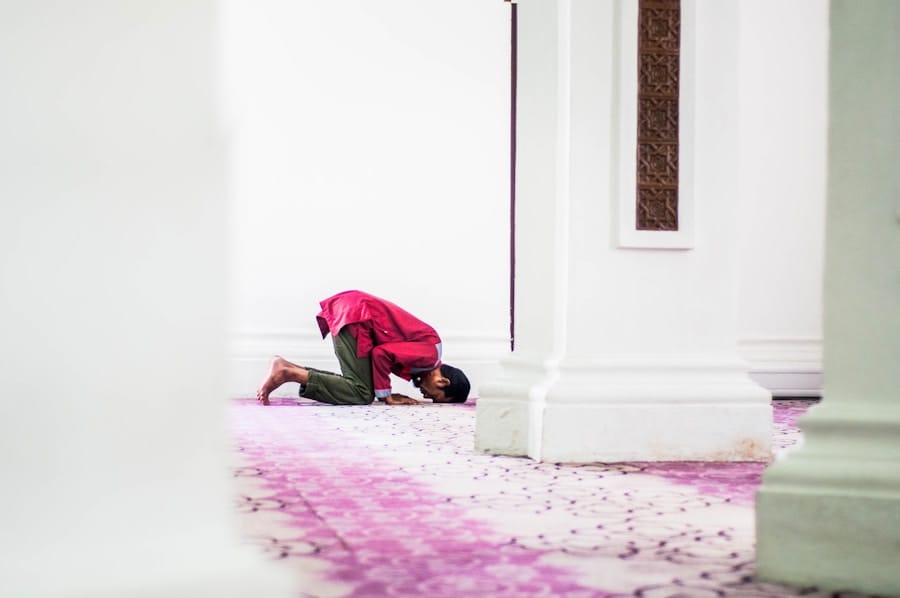The Hajj pilgrimage is one of the five pillars of Islam and is considered a sacred journey for Muslims around the world. It is a once-in-a-lifetime obligation for those who are physically and financially able to make the trip to Mecca. The journey begins with a state of ihram, a sacred state of purity and devotion, and continues with a series of rituals and prayers over the course of several days. The pilgrimage is a deeply spiritual experience that brings Muslims closer to their faith and to Allah.
The journey of Hajj is not just a physical one, but also a mental and emotional one. Pilgrims must prepare themselves mentally and spiritually for the challenges and rewards that come with the pilgrimage. The journey to Mecca is a time for reflection, prayer, and self-discovery. It is a time to let go of worldly distractions and focus on one’s relationship with Allah. The pilgrimage is a test of patience, endurance, and faith, as pilgrims face physical hardships and emotional challenges along the way. Despite the difficulties, the Hajj journey is a deeply rewarding experience that leaves a lasting impact on the hearts and minds of those who make the pilgrimage.
The Historical and Religious Significance of Hajj
The Hajj pilgrimage has deep historical and religious significance in Islam. It dates back to the time of Prophet Ibrahim (Abraham) and his son Isma’il (Ishmael), who are central figures in Islamic history. The rituals of Hajj are based on the actions of Prophet Ibrahim and his family, including the symbolic stoning of the devil, the running between Safa and Marwa, and the sacrifice of an animal. These rituals serve as a reminder of the faith and devotion of Prophet Ibrahim and his family, and they are reenacted by pilgrims as a way to honor their legacy.
The historical significance of Hajj is also tied to the Kaaba, the holiest site in Islam, which was built by Prophet Ibrahim and Isma’il as a place of worship for Allah. The Kaaba serves as the focal point of the Hajj pilgrimage, and pilgrims from all over the world gather around it to perform their rituals and prayers. The Kaaba is a symbol of unity and devotion for Muslims, and it holds great religious significance as a place where Allah’s presence is felt most strongly. The historical and religious significance of Hajj is deeply rooted in the traditions and teachings of Islam, and it continues to be a central pillar of faith for Muslims today.
The Rituals and Symbolism of Hajj
The Hajj pilgrimage is filled with rituals and symbolism that hold deep spiritual meaning for Muslims. One of the most important rituals is the tawaf, which involves walking around the Kaaba seven times in a counterclockwise direction. This act symbolizes the unity of Muslims around the world, as they come together to worship Allah at the holiest site in Islam. Another significant ritual is the sa’i, which involves walking between the hills of Safa and Marwa seven times, in remembrance of Hagar’s search for water for her son Isma’il. This ritual symbolizes perseverance and faith in Allah’s mercy.
The stoning of the devil is another important ritual during Hajj, where pilgrims throw pebbles at three pillars that represent Satan’s temptation of Prophet Ibrahim. This act symbolizes the rejection of evil and the triumph of good over temptation. The sacrifice of an animal during Hajj is also a symbolic act that commemorates Prophet Ibrahim’s willingness to sacrifice his son Isma’il at Allah’s command. These rituals and symbols are deeply meaningful for Muslims, as they serve as reminders of their faith, devotion, and commitment to Allah.
The Spiritual Transformation of Hajj: Personal Reflections
The Hajj pilgrimage is a transformative experience that has a profound impact on the spiritual lives of those who make the journey. Pilgrims often describe feeling a sense of peace, clarity, and spiritual awakening during their time in Mecca. The pilgrimage provides an opportunity for self-reflection, repentance, and renewal of faith. It is a time for pilgrims to seek forgiveness for past mistakes, to let go of worldly attachments, and to recommit themselves to living a life of piety and devotion.
The spiritual transformation that takes place during Hajj is often described as a deeply personal journey that brings about a sense of inner peace and fulfillment. Many pilgrims return from Mecca with a renewed sense of purpose, a deeper connection to their faith, and a greater appreciation for the blessings in their lives. The experience of Hajj often leads to positive changes in behavior, attitude, and outlook on life. It serves as a reminder to live with humility, gratitude, and compassion towards others. The spiritual transformation that comes with Hajj is a testament to the power of faith and the profound impact that religious devotion can have on one’s life.
The Unity and Equality of Hajj: A Global Community Coming Together
One of the most remarkable aspects of the Hajj pilgrimage is the sense of unity and equality that it fosters among Muslims from all walks of life. Regardless of nationality, ethnicity, or social status, all pilgrims are equal in the eyes of Allah during Hajj. They dress in simple white garments, perform the same rituals, and stand side by side in prayer at the Kaaba. The pilgrimage serves as a powerful reminder of the universal brotherhood and sisterhood that exists within Islam.
The unity that is experienced during Hajj extends beyond individual pilgrims to encompass the global Muslim community as a whole. Millions of Muslims from around the world come together in Mecca to perform the same rituals at the same time, creating a powerful sense of solidarity and connection. The diversity of languages, cultures, and backgrounds represented at Hajj serves as a testament to the universal appeal of Islam and its ability to bring people together in worship and devotion. The unity and equality experienced during Hajj are powerful reminders of the shared values and beliefs that unite Muslims as a global community.
Challenges and Triumphs of the Hajj Journey
The Hajj pilgrimage is not without its challenges, both physical and emotional. Pilgrims must endure long journeys, crowded conditions, extreme heat, and physical exertion as they perform their rituals in Mecca. The sheer number of people participating in Hajj can also present logistical challenges, such as crowd control, transportation, and accommodation. Despite these challenges, pilgrims often find strength in their faith and determination to overcome obstacles in order to fulfill their religious obligation.
The triumphs of the Hajj journey are many, as pilgrims experience moments of spiritual clarity, personal growth, and deep connection with Allah. The sense of accomplishment that comes with completing the rituals of Hajj is profound, as pilgrims feel a deep sense of fulfillment and gratitude for having been able to make the journey. The challenges faced during Hajj serve as opportunities for personal growth, resilience, and reliance on Allah’s guidance. The triumphs experienced during Hajj are a testament to the strength and determination of those who make the pilgrimage.
Carrying the Spirit of Hajj: Bringing the Experience Home
After completing the Hajj pilgrimage, many pilgrims return home with a renewed sense of purpose and commitment to their faith. They carry with them the spirit of Hajj – a spirit of humility, gratitude, compassion, and devotion – that they strive to embody in their daily lives. The experience of Hajj often leads to positive changes in behavior, attitude, and outlook on life. Pilgrims are inspired to live with greater kindness towards others, to be more mindful of their actions, and to seek opportunities for spiritual growth.
Bringing the spirit of Hajj home also involves sharing one’s experiences with family, friends, and community members. Pilgrims often recount their journey to Mecca with great enthusiasm, sharing stories of personal transformation, spiritual insights, and moments of connection with Allah. By sharing their experiences, pilgrims hope to inspire others to deepen their own faith, seek forgiveness for past mistakes, and strive for greater piety in their lives. The spirit of Hajj lives on long after the pilgrimage has ended, as pilgrims continue to carry its lessons with them in their hearts and minds.

